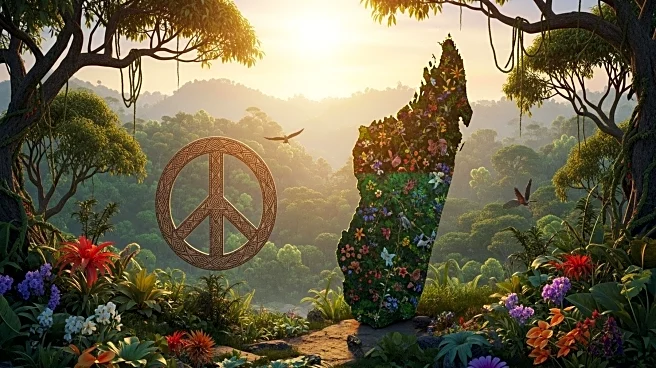What's Happening?
Madagascar's President Andry Rajoelina has committed to resolving the country's pressing issues within a year, stating he will resign if the problems persist. This announcement was made during a town-hall meeting at his palace, where he engaged with government supporters. The protests, led by the Gen Z Mada movement, initially sparked by water and electricity shortages, have expanded into broader dissatisfaction with corruption, unemployment, and the cost-of-living crisis. Despite Rajoelina's invitation to dialogue, the movement has rejected talks, citing repression and assaults on youth protesters. The president has promised to address power outages by adding 265 megawatts to the national grid. The protests, which began on September 25, have resulted in clashes with security forces, leading to at least 22 deaths and numerous injuries.
Why It's Important?
The situation in Madagascar highlights significant political and social unrest, with potential implications for governance and stability in the region. President Rajoelina's pledge to resign if issues are not resolved underscores the pressure on leadership to address public grievances effectively. The Gen Z Mada movement's rejection of dialogue reflects deep-seated mistrust in the government, which could lead to prolonged instability. The economic challenges, including power shortages and high unemployment, are critical issues that need urgent attention to prevent further deterioration of living conditions. The international community may closely monitor these developments, given the potential for humanitarian concerns and the impact on regional security.
What's Next?
The Gen Z Mada movement has called for new protests, indicating continued unrest and potential escalation of tensions. President Rajoelina's promise to resolve power outages and other issues will be closely scrutinized, with his political future hinging on tangible improvements. The appointment of an army general as prime minister suggests a strategic move to stabilize the situation, but it remains to be seen how effective this will be in quelling protests. The government's response to ongoing demonstrations and its ability to engage in meaningful dialogue with opposition groups will be crucial in determining the country's trajectory.
Beyond the Headlines
The protests in Madagascar reflect broader global trends of youth-led movements demanding accountability and change from political leaders. The emphasis on basic human rights and government transparency resonates with similar movements worldwide. The situation also raises ethical questions about the use of force against protesters and the role of military intervention in political affairs. Long-term, the events in Madagascar could influence regional dynamics, potentially inspiring similar movements in neighboring countries facing comparable challenges.










